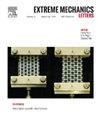spinodal超材料的实验有限应变反设计
IF 4.5
3区 工程技术
Q2 MATERIALS SCIENCE, MULTIDISCIPLINARY
引用次数: 0
摘要
Spinodal超材料的结构灵感来自自然相分离过程,在设计具有极端性能的机械超材料时,提供了周期性和对称形态的重要替代方案。虽然它们的弹性力学性能已经被系统地确定,但它们的大变形、非线性响应一直是预测和设计的挑战,部分原因是数据集有限,需要复杂的非线性模拟。这项工作提出了一种新的物理增强机器学习(ML)和优化框架,旨在解决在计算建模受限和实验数据稀疏的大变形场景下设计具有定制力学性能的复杂spinodal超材料的挑战。该方法直接利用大变形试验数据,便于具有精确有限应变力学响应的旋轴结构反设计。该框架揭示了在spinodal超材料中不稳定诱导的模式形成——实验观察和选择的非线性模拟——利用以非凸能势形式存在的基于物理的归纳偏差。总之,这种结合ML,实验和计算的努力为大变形场景下复杂旋量超材料的有效和精确设计提供了一条途径,在这种情况下,能量吸收和非线性破坏机制的预测是必不可少的。本文章由计算机程序翻译,如有差异,请以英文原文为准。
Experiment-informed finite-strain inverse design of spinodal metamaterials
Spinodal metamaterials, with architectures inspired by natural phase-separation processes, have presented a significant alternative to periodic and symmetric morphologies when designing mechanical metamaterials with extreme performance. While their elastic mechanical properties have been systematically determined, their large-deformation, nonlinear responses have been challenging to predict and design, in part due to limited data sets and the need for complex nonlinear simulations. This work presents a novel physics-enhanced machine learning (ML) and optimization framework tailored to address the challenges of designing intricate spinodal metamaterials with customized mechanical properties in large-deformation scenarios where computational modeling is restrictive and experimental data is sparse. By utilizing large-deformation experimental data directly, this approach facilitates the inverse design of spinodal structures with precise finite-strain mechanical responses. The framework sheds light on instability-induced pattern formation in spinodal metamaterials—observed experimentally and in selected nonlinear simulations—leveraging physics-based inductive biases in the form of nonconvex energetic potentials. Altogether, this combined ML, experimental, and computational effort provides a route for efficient and accurate design of complex spinodal metamaterials for large-deformation scenarios where energy absorption and prediction of nonlinear failure mechanisms is essential.
求助全文
通过发布文献求助,成功后即可免费获取论文全文。
去求助
来源期刊

Extreme Mechanics Letters
Engineering-Mechanics of Materials
CiteScore
9.20
自引率
4.30%
发文量
179
审稿时长
45 days
期刊介绍:
Extreme Mechanics Letters (EML) enables rapid communication of research that highlights the role of mechanics in multi-disciplinary areas across materials science, physics, chemistry, biology, medicine and engineering. Emphasis is on the impact, depth and originality of new concepts, methods and observations at the forefront of applied sciences.
 求助内容:
求助内容: 应助结果提醒方式:
应助结果提醒方式:


